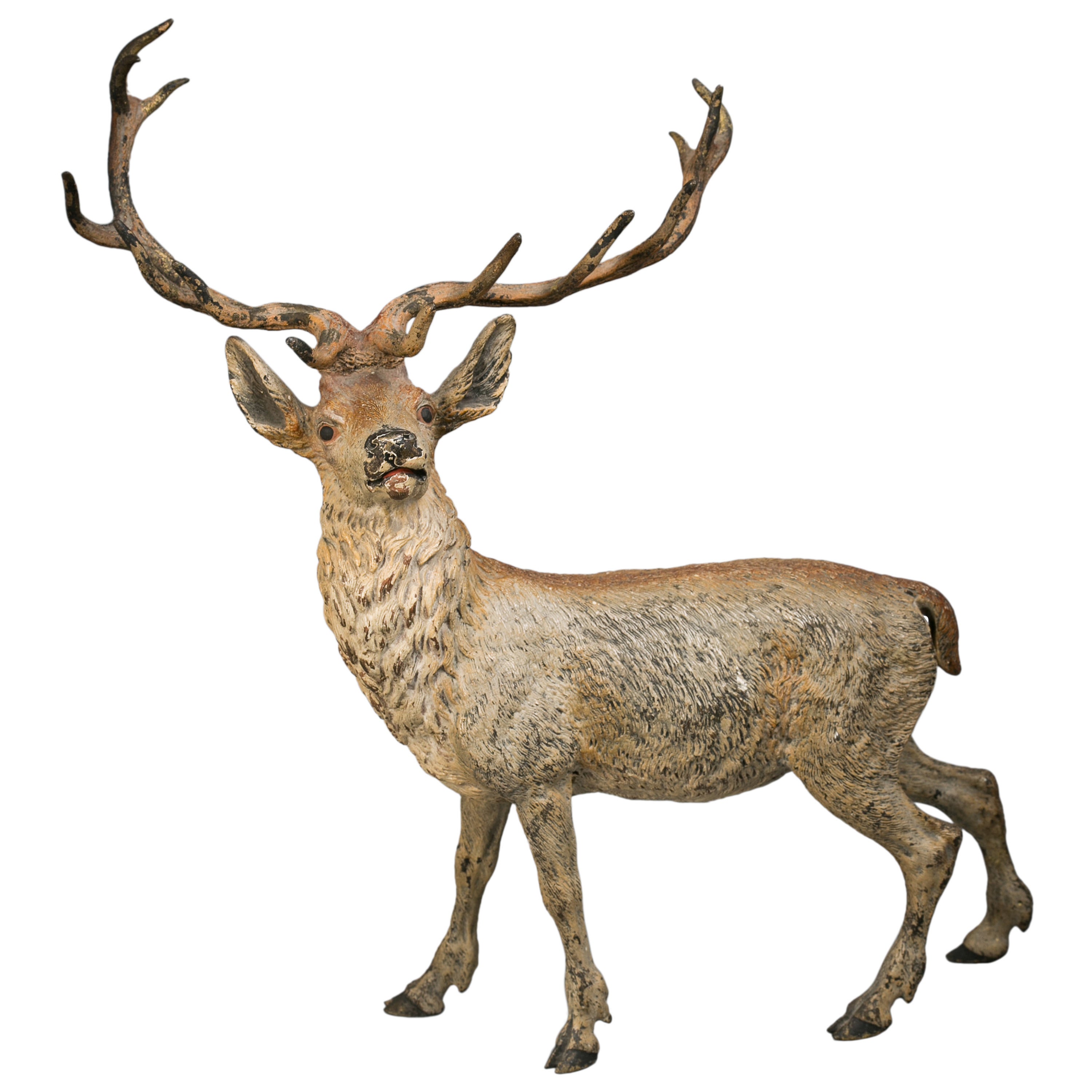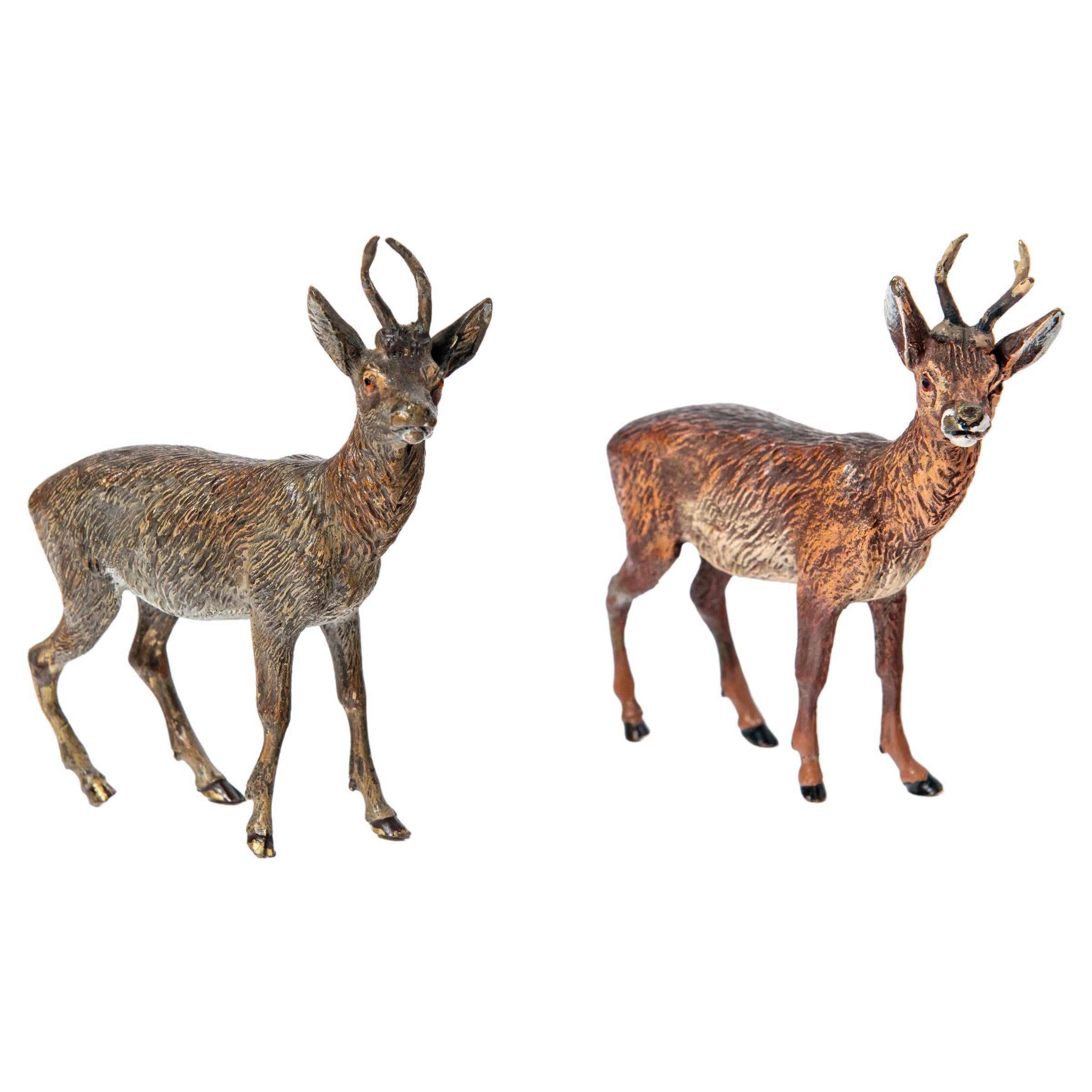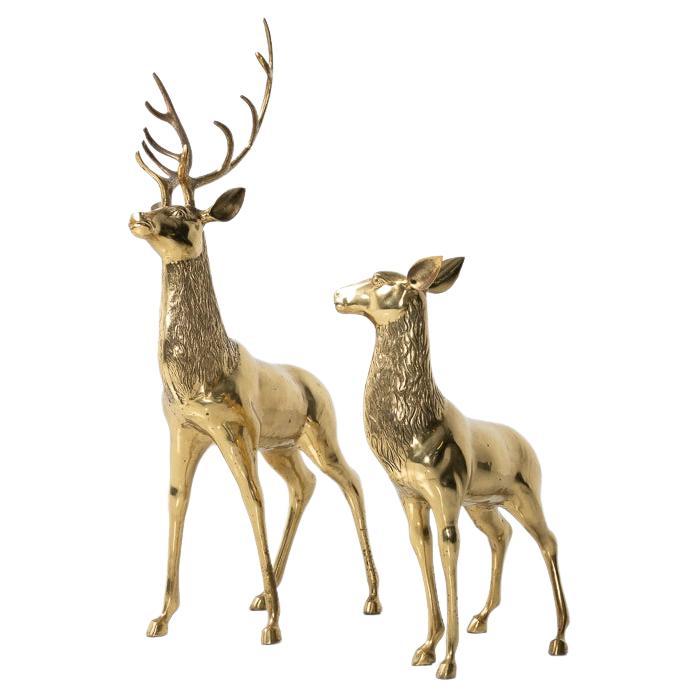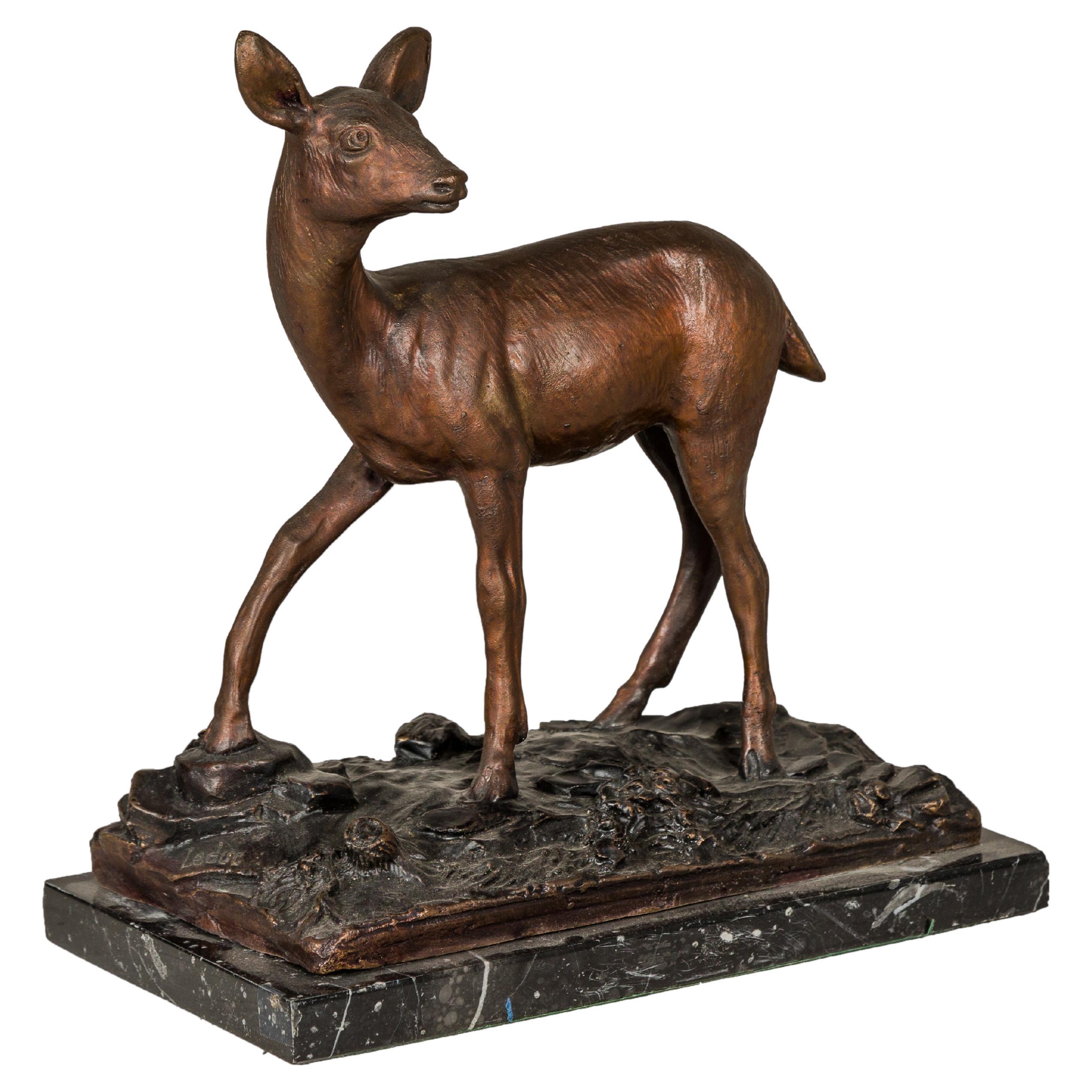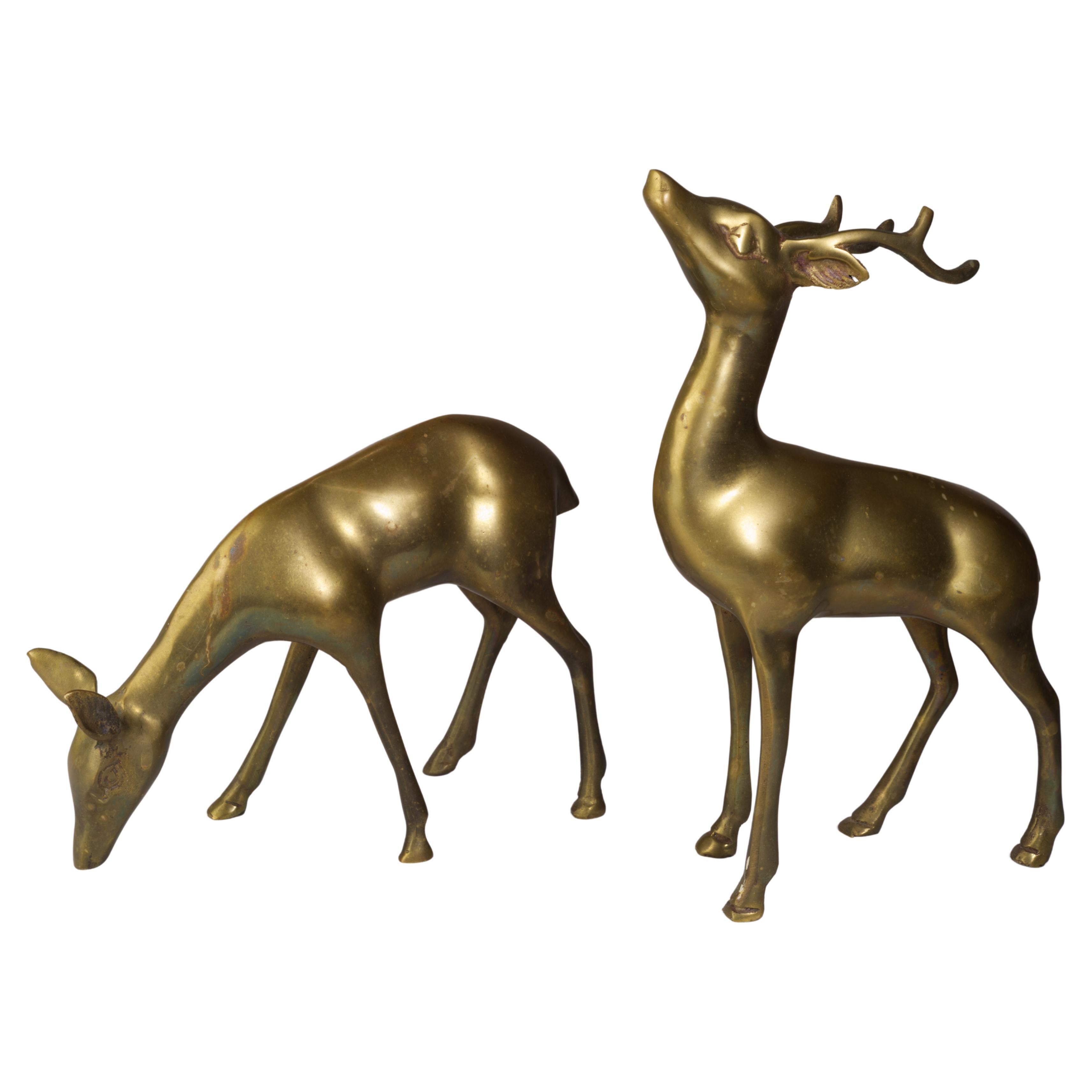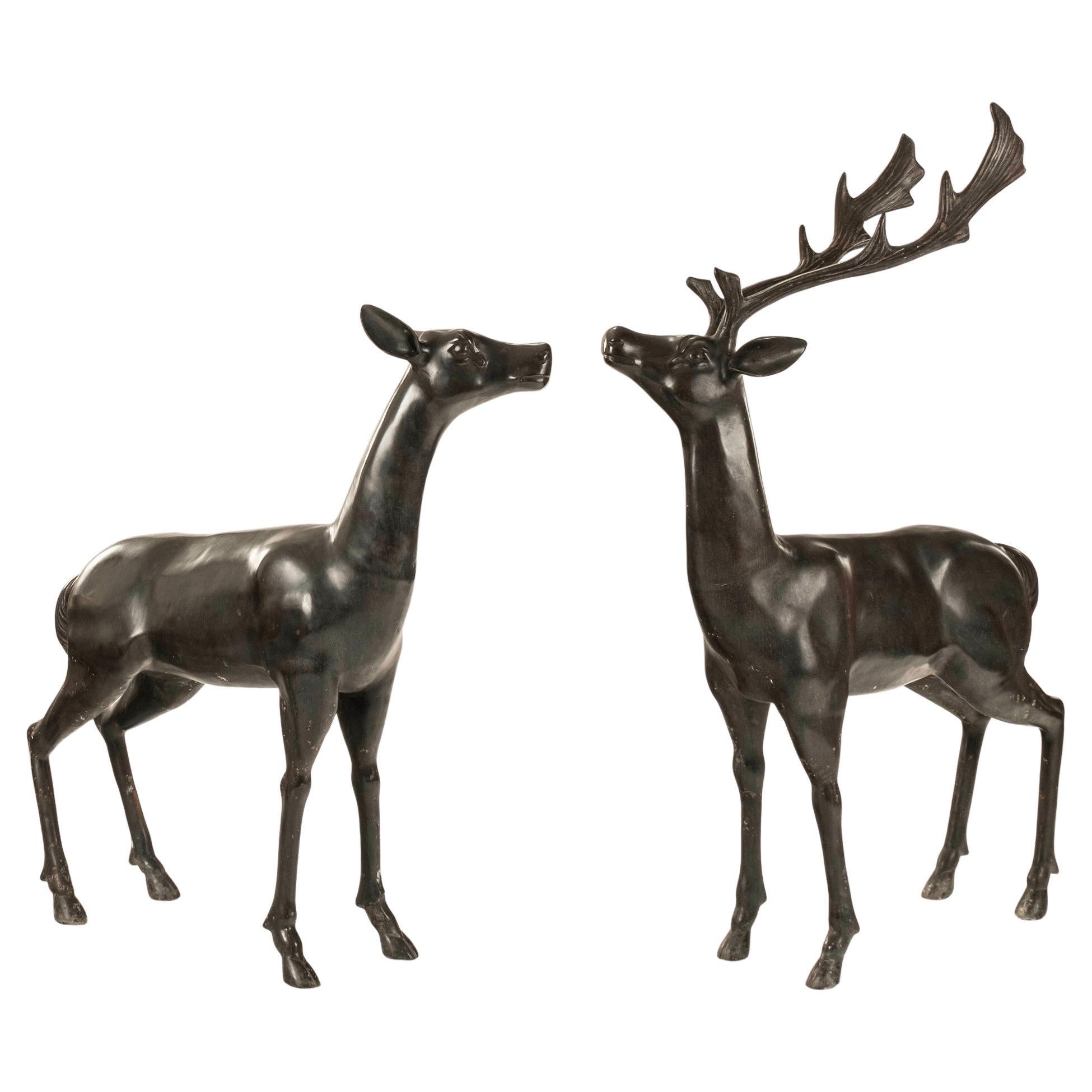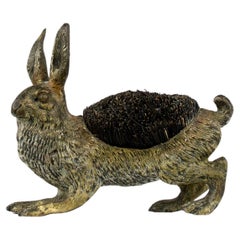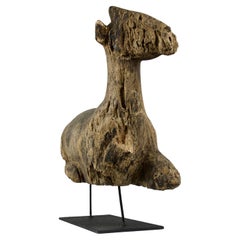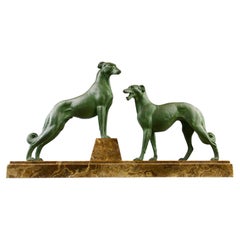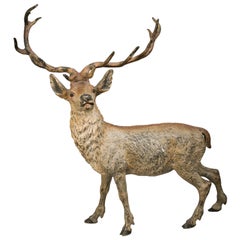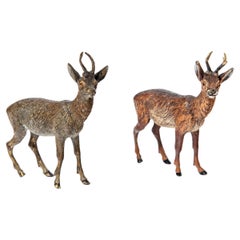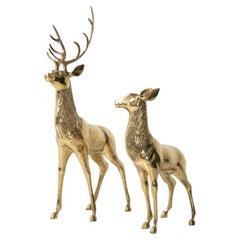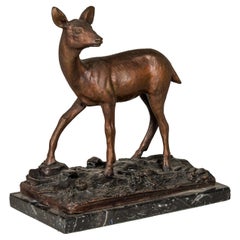Items Similar to Vienna Bronzes, Deer and Doe Sculptures, 19th Century
Want more images or videos?
Request additional images or videos from the seller
1 of 19
Vienna Bronzes, Deer and Doe Sculptures, 19th Century
$2,929.26
£2,168.54
€2,450
CA$4,053.36
A$4,468.74
CHF 2,337.90
MX$54,823.12
NOK 29,429.53
SEK 27,521.26
DKK 18,662.60
About the Item
Superb 19th century Vienna bronze sculptures of a stag, the doe is a late 20th century/early 21st production of Vienna bronzes. The deer sculpture is attributed to the Geschütz manufacture as similar models are referenced and signed. It was also used as a cleaning brush for quills as seen by the hair on its back.
Good condition.
Dimensions in cm ( H x L x l ) :
- Stag : 12.5 x 15 x 8
- Doe : 9.5 x 10.5 x 4
Secure shipping.
- Attributed to:Geschutzt (Manufacturer)
- Dimensions:Height: 4.93 in (12.5 cm)Width: 5.91 in (15 cm)Depth: 3.15 in (8 cm)
- Style:Romantic (Of the Period)
- Materials and Techniques:
- Place of Origin:
- Period:
- Date of Manufacture:Late 19th Century
- Condition:Wear consistent with age and use.
- Seller Location:PARIS, FR
- Reference Number:1stDibs: LU8131233619132
About the Seller
5.0
Vetted Professional Seller
Every seller passes strict standards for authenticity and reliability
Established in 2020
1stDibs seller since 2023
17 sales on 1stDibs
Typical response time: 1 hour
- ShippingRetrieving quote...Shipping from: PARIS, France
- Return Policy
Authenticity Guarantee
In the unlikely event there’s an issue with an item’s authenticity, contact us within 1 year for a full refund. DetailsMoney-Back Guarantee
If your item is not as described, is damaged in transit, or does not arrive, contact us within 7 days for a full refund. Details24-Hour Cancellation
You have a 24-hour grace period in which to reconsider your purchase, with no questions asked.Vetted Professional Sellers
Our world-class sellers must adhere to strict standards for service and quality, maintaining the integrity of our listings.Price-Match Guarantee
If you find that a seller listed the same item for a lower price elsewhere, we’ll match it.Trusted Global Delivery
Our best-in-class carrier network provides specialized shipping options worldwide, including custom delivery.More From This Seller
View AllHare, Vienna Bronze, Austria, 1900
By Geschutzt
Located in PARIS, FR
Beautiful representation of a polychromed hare Vienna bronze, Austria 1900s. The back is encrusted with boar hair and was used to clean writing quills.
In excellent condition. Sligh...
Category
Antique Early 1900s Austrian Romantic Animal Sculptures
Materials
Bronze
Han Dynasty, Laying Doe Wood Sculpture, China 100AD
Located in PARIS, FR
Superb sculpture of a laying doe from the Chinese Han Dynasty (206BC-220AD). Remainders of polychromic paint, namely red, symbol of good fortune and joy as well as the season of summer, and green, symbol of vigor and vitality and the season of spring. Mounted on base.
A similar sculpture in bronze is kept at the Met Museum with the following description " A low bed, small table, and screen were often the only furnishings in a Han-dynasty room. The floors were generally covered with mats kept in place with weights in the shape of single animals, fighting beasts, or entertainers."
Condition seen in pictures.
Dimensions in cm ( H x L x l ) :
- Sculpture : 35 x 40 x 10
- With base : 45.5 x 44 x 15
The Han Dynasty ruled China from 206 B.C. to 220 A.D. and was the second imperial dynasty of China. It is known for its promotion of Confucianism as the state religion and opening the Silk Road trade route to Europe, permanently altering the course of Chinese history. Han Dynasty art and inventions like paper still influence the world today.
From the Han Dynasty to the present, deer can be found in many materials and media—rock crystal, nephrite, ink on paper, porcelain, cloisonné enamel, jade, bamboo root, textile, bronze, etc.—alone or in groups, among trees and rocks and in various positions. They appear on everyday objects, from boxes to incense burners, incense holders, lamps, mirror holders and the droppers scholars used when they wrote. A symbol of longevity and grace in Chinese mythology, the word deer is pronounced lu, a homonym for emoluments—favors granted to officials. They therefore represent wealth, nobility and success in imperial examinations (civil service exams for selecting candidates for the state bureaucracy in Imperial China).
Deer were the faithful companions of Shu Lao, the god of longevity, and the goddess Magu. They were reputed to live long and to be the only creature able to find the mushroom of immortality, linghzhi. Although its spots are different, deer are sometimes confused or associated with stags, a Manchu hunting trophy whose antlers served to make prestigious furniture. (La Gazette Drouot, Claire Papon)
For the colours found on this piece, in Chinese culture, red symbolizes good fortune and joy. Green, symbolizes the spring when everything is brimming over with vigor and vitality.
The Han Dynasty (206 B.C. to 220 A.D.) continued the Qin Dynasty’s use of dark colours, but incorporated red. During the earlier years, or Western Han Dynasty, ordinary people wore red while court dress was black. Shoes were red in color. The clothing worn for sacrificial rites was black edged with red. In the later Eastern Han Dynasty, red symbolized the dynasty’s “fire Virtue” and became predominant. Court dress was red. Sacrificial rites called for a red-edged white layer under robes with red socks...
Category
Antique 15th Century and Earlier Chinese Han Mounted Objects
Materials
Wood
Att. to Louis Albert Carvin, Greyhound Sculpture, French Art Deco 1930s
Located in PARIS, FR
Superb and large sculpture of two alert greyhounds in beautiful Art Deco period green patina. Attributed to Louis Albert Carvin. Set on an elegant brown and white veined marble base....
Category
Vintage 1930s French Art Deco Animal Sculptures
Materials
Marble, Spelter
Charles Valton, The Tracking Wolf, Romantic Period Sculpture 19th Century France
By Charles Valton
Located in PARIS, FR
Superb wolf sculpture in bronze and marble flooring simulating snow by the artist Charles Valton. The wolf dutifully follows an adventurer whose ste...
Category
Antique 19th Century French Romantic Animal Sculptures
Materials
Marble, Bronze
A. Plisnier and Gorini Frères Foundry, Fennec Foxes Sculpture, Art Deco 1920s
By Edouard-Marcel Sandoz
Located in PARIS, FR
Superb patinated bronze sculptural composition by A. Plisnier of two Fennec foxes huddling together manufactured and smelted by the Gorini Frères Foundry...
Category
Vintage 1920s French Art Deco Animal Sculptures
Materials
Belgian Black Marble, Bronze
Elephant Fight, Patinated Earthenware Sculpture, France 1800s
Located in PARIS, FR
Superb patinated earthenware sculpture representing two elephants fighting, France 1800s, Romantic period. Beautiful details enhancing the vivacity of the...
Category
Antique 19th Century French Romantic Animal Sculptures
Materials
Earthenware
You May Also Like
Vienna Bronze Deer, circa 1890
Located in New York, NY
Vienna bronze deer, circa 1890.
Category
Antique Late 19th Century Austrian Animal Sculptures
Materials
Bronze
Pair of Cold-painted bronze deers sculpture attributed to Franz Bergmann
By Franz Bergmann
Located in Buenos Aires, Buenos Aires
Pair of Cold-painted bronze deers sculpture attributed to Franz Bergmann. Austria, early 20th century.
Category
Early 20th Century Austrian Belle Époque Animal Sculptures
Materials
Bronze
Large Deer Sculptures in Bronze, Italy, 1970
By Jacques Duval Brasseur
Located in Roosendaal, Noord Brabant
Very nice set of 2 large deer sculptures made of solid bronze, Italy 1970. These almost life sized sculptures are made of solid bronze and are ver...
Category
Vintage 1970s Italian Hollywood Regency Animal Sculptures
Materials
Brass
$5,798 / set
Bronze Deer Sculpture Mounted on Marble and Bronze Textured Base
Located in Yonkers, NY
A vintage bronze deer sculpture mounted on a bronze and black marble base. This vintage bronze deer sculpture, elegantly mounted on a unique base that combines bronze and black marbl...
Category
20th Century Animal Sculptures
Materials
Bronze
Mid-Century Modern Pair of Bronze Deer Figurines
Located in Clifton Springs, NY
Mid-Century Modern pair of bronze deer consists of one buck and one doe, with the buck standing upright displaying his antlers and the doe grazing on the ground.
The brass has nic...
Category
Mid-20th Century Korean Mid-Century Modern Animal Sculptures
Materials
Brass
Pair Bronze Stag & Doe Statues
Located in Houston, TX
Pair of 20th Century bronze stag and doe statues.
Overall stag dimensions:58"H x 41"W x 18"D.
Overall doe dimensions:44.75"H x 42.5"W x 12.5"D.
Category
Late 20th Century Statues
Materials
Bronze
$7,250 / set
More Ways To Browse
Deer Bronze
Bronze Deer
Vienna Bronzes Animals
Bronze Stags
Antique Bronze Deer
Antique Bronze Stag
19th Century Bronze Stag
Vienna Bronze Stag
Hand Blown Glass Figurines
Lion Lioness
Stag Vintage Furniture
Italian Ceramic Statue
Wooden Horse Sculpture
Yellow Glass Sculpture
Black Cat Sculpture
Bull Midcentury Modern
Ceramic Dogs
Italian Horse Head Sculpture
